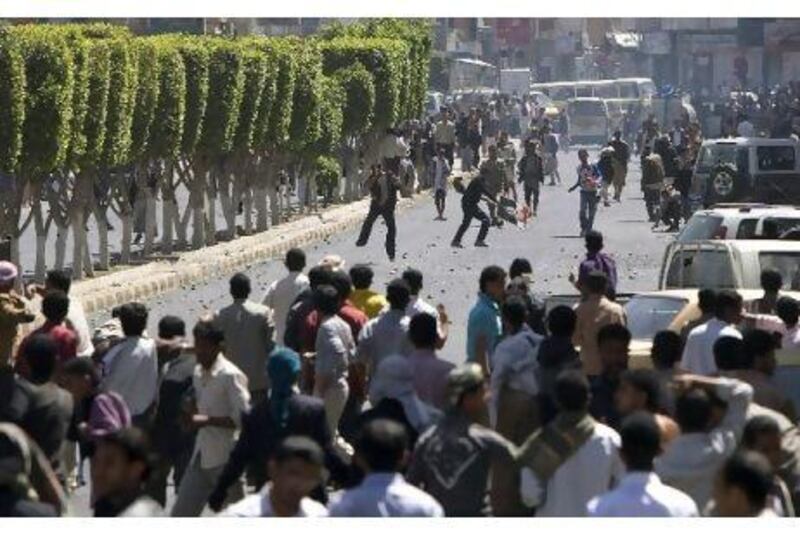SANA'A // An anti-government protester was shot dead and eight others were injured yesterday when supporters of President Ali Abdullah Saleh, opened fire at thousands of protesters demanding his resignation for the 10th consecutive day.
About 3,000 protesters, mostly students and activists, gathered in front of Sana'a University.
Attacked by the government supporters armed with batons, daggers and pistols, the protesters threw stones and managed to push them back before they were fired at. Policemen, including those in plainclothes, were seen shooting at the crowd.
One protester died after being shot in his neck and eight others were reported injured.
"Dozens of the thugs of the ruling party were shooting randomly at us," said Esam al Hajjaji, an anti-government protester who was shot in the leg.
"They are shouting 'no to chaos', while they are inciting chaos and disorder. We are protesting peacefully," said Mr al Hajjaji.
Clashes continued for several hours in streets and alleys.
Despite heavy presence, police were unable to control the crowds. A Yemeni interior ministry official denied that a protester had been killed, according to the ministry's Sep26.net news website.
Mr Saleh, who has been in power for past 32 years, said earlier this month that he would not seek to extend his term beyond 2013 but his promise has failed to satisfy the thousands.
In a move to support anti-government protests, 10 members of the ruling General People's Congress yesterday withdrew from the parliament's session and threatened to resign over increasing violence against protesters and the absence of any rule for the parliament at this "critical moment in Yemen".
"President Saleh has peacefully served the country for 33 years and he does not need these masses which tarnish his record by such acts," Abdu Bishr, an MP from the ruling party, said yesterday.
Meanwhile, Sons of Yemen League, an opposition group, announced yesterday that it would join the protests.
In Taiz, south of Sana'a, one person was injured yesterday when police opened fire to stop hundreds of people arriving from al Maafir village to join the protest at the Freedom Square.
Meanwhile, residents of Yemen's port city Aden, where fierce riots have resulted in at least four deaths, said troops in armoured vehicles had deployed in the main streets, at the entrances to some districts and at major buildings such as the governor's office. Police had withdrawn from the streets, apparently to avoid confrontation with protesters who gathered in some areas.
The vice president, Abd Rabou Mansour, met top officials in Aden and decided to seal off the city for a 12-hour period, ending at 6am today, to prevent people outside Aden from joining the protests, a security official said.
Mr Saleh continued to hold meetings with tribal leaders from Sana'a during the past six days, a move seen here as an attempt to gain their loyalty as protests continue.
"They [protesters] have what we call 'dengue fever' as they are imitating what is happening in other countries," Mr Saleh reportedly said yesterday during a meeting with a group of tribal leaders and social dignitaries from the neighbouring province of Amran.
"No to chaos, no to coups, yes to security and stability…. Our people are with security and stability as they have suffered in the past from the wars and there are now calls for a civil war by outlaws who have foreign agenda," he added.
Several civil society organisations have considered the meetings a serious step to incite the tribes against peaceful protests.
* With additional reporting by Associated Press and Agence France-Presse






